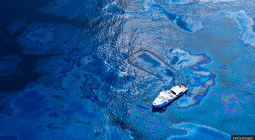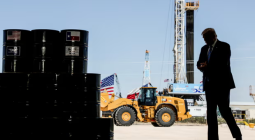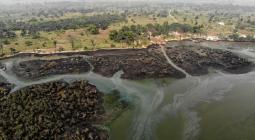Russian tanker sinks in Black Sea spilling 4,300 tonnes of oil
Ukraine accuses Moscow of recklessness due to risk of ecological damage as second tanker runs aground
A Russian tanker carrying more than 4,000 tonnes of oil products has sunk in the Black Sea amid stormy conditions while a second has run aground, threatening an ecological disaster.
The cargo ship Volgoneft-212 snapped in half on Sunday after being hit by a large wave. Video showed its bow end sticking vertically out of the water. The boat got into difficulties off the east coast of occupied Crimea, 5 miles (8km) from the Kerch strait, Russian media reported.
Russian investigators opened two criminal cases to look into possible safety violations after at least one person was killed when the 136-metre tanker, which had 15 people on board, went down.
The tanker was carrying 4,300 tonnes of low-grade heavy fuel oil, known as mazut. Russia’s emergency service launched a rescue operation involving tugboats and a Mil Mi-8 helicopter. Twelve other people were evacuated, eleven of whom were taken to hospital, with two in a serious condition, the Tass news agency quoted Alexei Kuznetsov, an aide to the health minister, as saying.
Shortly afterwards, another cargo transporter, the Volgoneft-239, got into difficulties in the same area. It was carrying 4 tonnes of fuel oil. Initial reports also suggested the ship had sunk. “Another ship is going down. Holy shit!” a sailor said, filming from a nearby boat.
However, the emergencies ministry said the 132-metre vessel, built in 1973, had run aground 80 m from shore near the port of Taman at the south end of the Kerch Strait.
The ministry later wrote on Telegram that efforts to evacuate the 14-member crew had been suspended because of bad weather. The ministry said rescue teams were in contact with the ship, which had all facilities on board necessary to ensure the lives of the crew were not in danger.
Official statements did not provide details on the extent of the spill or why the first tanker had sustained such serious damage.
President Vladimir Putin ordered the government to set up a working group to deal with the rescue operation and mitigate the impact of the fuel spill, news agencies cited Kremlin spokesperson Dmitry Peskov as saying, after Putin met with the ministers for emergencies and environment.
Ukrainian officials accused Moscow of recklessness. Dmytro Pletenchuk, Ukraine’s navy spokesperson, said: “These are quite old Russian tankers. You can’t go to sea in such a storm. The Russians violated the operating rules. The result is an accident.”
Commentators pointed out that the oil products, if spilled into the Black Sea, would cause serious ecological damage to a marine environment already badly affected by war.
The Volgoneft-212 was 55 years old, registered in St Petersburg and recently refitted. The centre was cut out and the stern and bow were welded together, forming a huge seam in the middle. It is this section that appears to have broken.
Crew members watched as the helpless ship was wrecked. Video footage showed men standing in the bridge wearing orange lifejackets. A black slick could be seen floating on the surface, next to a parabolic upturned bow. Waves crashed over the stricken hull.
The accident involving decrepit Russian boats is the latest marine catastrophe to take place near the coast of southern Ukraine. The Black Sea has been a zone of intense military conflict since the start of Vladimir Putin’s 2022 full-scale invasion of the country.
Ukraine has used sea drones and other missiles to sink some of Russia’s Black Sea fleet. It has been forced to leave the Crimean port of Sevastopol and to relocate to the safer Russian harbour of Novorossiysk.
In June 2023, Russian troops blew up the Kakhovka hydroelectric dam over the Dnipro River, in occupied territory, in order to hamper a Ukrainian military attack. The explosion released 18bn tonnes of water held upstream in a giant reservoir.
The floodwater swept away dozens of villages. Water contaminated with fuel, sewage and fertilisers cascaded into the Black Sea. According to biologists, the pollution wiped out mussels and other molluscs, as well as fish and crustaceans.
Scientists have recorded a rise in deaths among dolphins and porpoises since the Kremlin’s all-out attack. About 1,000 cetaceans were killed in 2022. Populations of bottlenose and white-sided dolphins suffered.
Cover photo: Two Russian tankers sink in Black Sea spilling 4,300 tonnes of oil






